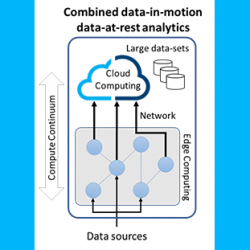Cloud Computing QoS for Real-Time Data Applications
Data applications and data-driven services are expected to realise the benefits from big data by building algorithmic logic from data (for example, by means of supervised machine learning techniques) instead of the traditional classical systems development life cycle. Continuous adaptation to complex environments, real-time automated decision-making and, ultimately, systems autonomy, are among the expected benefits. These applications and services are expected to build their data-driven capability from both data in motion (real-time, streaming) and data at rest (historical, batch). The European project CLASS explores the distribution of these two kinds of analytics workloads along the compute continuum (see Figure above): from the cloud (public and/or private) to the edge (connected things and network edge devices). The project’s application domains are smart cities and connected cars (as a precursor to autonomous cars). In these areas, the benefits of distributing tasks along the compute continuum are clear: reliability, availability and privacy provided by the edge combined with cost efficiency provided by the cloud. However, two main challenges arise: tasks deployed at the edge (for example, on board the connected car) need to guarantee “hard real-time” responses (e.g. very low latency) and those deployed at the cloud need to guarantee certain QoS levels regarding time: right-time or “soft real-time” guarantees. The CLASS project combines two different types of real-time requirements within a unified framework, to meet both the safety and business real-time requirements of the system: In system components with safety-critical (life-critical) and mission-critical real-time requirements (a.k.a. “hard real-time”), engineers must provide robust evidence about the correct timing behaviour of the system. These system components oversee the control of components that could result in human life being endangered or affect the integrity of the system, for example in the automotive or the aerospace domains. For reasons of latency and connectivity, these functions operate at the edge, as in the case of Advanced Driver-Assistance Systems (ADAS) which execute within on-board car computers. In systems components with business-critical real-time requirements, engineers must provide QoS guarantees (a.k.a. “soft real-time” guarantees). These systems oversee functions that can enhance the overall service but are not fundamental for their correct operation and/or overall success; for example, determining the most time-efficient car route. The data services and operations providing the intelligence for this type of function can be deployed in the cloud for reasons of cost effectiveness. This kind of task may be offloaded from the connected object to the cloud. In CLASS, “soft real-time” constraints imposed on cloud computing services will be satisfied by following a QoS approach implemented by three interrelated components: The Cloud Analytics Service Management (CASM) service will accept the time constraints specified by the engineers as a parameter and will ensure the initial deployment satisfies them. The Service Level Agreement (SLA) will reflect time constraints such as the Budget (average computational time of the task), the Deadline (point in time at which results may be not valid anymore) or the Period (periodicity with which the task needs to be executed). The Cloud Analytics Service Scalability (CASS) service would receive alerts from the SLA Manager and ensure the SLA by provisioning more cloud resources. The SLA Manager will continuously monitor tasks’ time performance and trigger alerts when they do not reach certain service-level objectives; this alert will trigger adaptation mechanisms in both CASM and CASS components. Read the full article on the CLASS website: https://class-project.eu/news/cloud-computing-qos-real-time-data-applications(opens in new window)
Keywords
Countries
Spain, Israel, Italy



